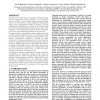Free Online Productivity Tools
i2Speak
i2Symbol
i2OCR
iTex2Img
iWeb2Print
iWeb2Shot
i2Type
iPdf2Split
iPdf2Merge
i2Bopomofo
i2Arabic
i2Style
i2Image
i2PDF
iLatex2Rtf
Sci2ools
112
click to vote
DATE
2007
IEEE
2007
IEEE
Dynamic reconfiguration in sensor networks with regenerative energy sources
In highly power constrained sensor networks, harvesting energy from the environment makes prolonged or even perpetual execution feasible. In such energy harvesting systems, energy sources are characterized as being regenerative. Regenerative energy sources fundamentally change the problem of power scheduling for embedded devices. Instead of the problem being one of maximizing the lifetime of the system given a total amount of energy, as in traditional battery powered devices, the problem becomes one of preventing energy depletion at any given time. Coupling relatively computationally intensive applications, such as video processing applications, with the constrained FPGAs that are feasible on power constrained embedded systems, makes dynamic reconfiguration essential. It provides the speed comparable to a hardware implementation, but it also allows the dynamic reconfiguration to meet the multiple application needs of the system. Different applications can be loaded on the FPGA, as the...
DATE 2007 | Dynamic Reconfiguration | Energy Harvesting Systems | Hardware | Regenerative Energy Sources |
Related Content
| Added | 02 Jun 2010 |
| Updated | 02 Jun 2010 |
| Type | Conference |
| Year | 2007 |
| Where | DATE |
| Authors | Ani Nahapetian, Paolo Lombardo, Andrea Acquaviva, Luca Benini, Majid Sarrafzadeh |
Comments (0)

